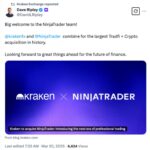In the ever-evolving landscape of cryptocurrency, this week’s edition of The Protocol offers a fascinating look at significant developments reshaping the sector. Vitalik Buterin, co-founder of Ethereum, has put forth an audacious proposal to replace the Ethereum Virtual Machine (EVM) with RISC-V, an open-source framework that promises enhanced efficiency and simpler execution for smart contracts. This move is seen as a potential remedy for existing scaling challenges faced by Ethereum, a network that has continuously pushed technological boundaries since its inception.
“Transitioning Ethereum to a RISC-V architecture will greatly improve the efficiency of the Ethereum execution layer,” says Buterin.
In legal news, Matter Labs, the creators behind the popular layer-2 solution ZKSync, have found themselves embroiled in a lawsuit alleging intellectual property theft. Former employees of the defunct BANKEX claim that technology pivotal to the inception of Matter Labs was unlawfully appropriated, raising questions about innovation and competition within the blockchain sphere.
Meanwhile, Scroll, another Ethereum layer-2 network, is making headlines with its launch of the Euclid upgrade, marking a significant leap towards a more decentralized platform. This upgrade transitions Scroll from a “stage 0” to “stage 1,” retiring centralized safety features and signaling a commitment to decentralization—a key ethos in the cryptocurrency community.
“Euclid represents the biggest leap forward for Scroll since its inception,” stated Scroll Labs.
Additionally, EigenLayer has realized a long-awaited goal by introducing its “slashing” feature to enhance accountability among users in its restaking network. This update aims to maintain network integrity by penalizing dishonest behavior, marking a critical step in fulfilling the protocol’s promise made nearly a year ago.
As the cryptocurrency industry continues to grapple with technological advancements, legal challenges, and evolving regulatory landscapes, these stories offer a glimpse into the complexities and innovations driving the future of digital assets. Stay tuned for more insights as we unravel the latest trends and narratives from the world of crypto technology.

The Protocol: Weekly Wrap-Up on Cryptocurrency Tech Development
This week’s edition highlights significant developments in the cryptocurrency sector that can impact both the technology landscape and the reader’s engagement with the crypto space:
- Vitalik Buterin’s Proposal to Replace the Ethereum Virtual Machine:
- Proposal involves transitioning to RISC-V architecture for better efficiency and simplicity.
- This change could resolve scaling bottlenecks, potentially enhancing user experience on Ethereum.
- Impact on developers: Easier integration across EVM-compatible chains may encourage more innovation and app development.
- Legal Action Against Matter Labs:
- Allegations of intellectual property theft against Matter Labs by BANKEX.
- Outcome could affect ZKSync’s operations and investor confidence in startup projects.
- Significance of protecting intellectual property and the risks involved in startup innovation highlighted.
- Scroll’s Euclid Upgrade:
- Marks the transition to ‘Stage 1’ decentralization, indicating a move away from centralized controls.
- This upgrade may enhance user trust and network security as it promotes a more decentralized ecosystem.
- Potential for greater participation from the community and developers in the governance and operation of the network.
- EigenLayer Introduces ‘Slashing’ Feature:
- New feature designed to enhance the integrity of the “restaking” network by penalizing harmful actions.
- This could attract more users to the protocol, as it enhances trust and reliability.
- Implications for overall ecosystem health by incentivizing honest behavior among participants.
These developments underscore the dynamic nature of the cryptocurrency space and highlight the ongoing innovations and challenges that can directly affect users, developers, and investors alike.
Comparative Analysis of Recent Developments in Cryptocurrency Tech
The cryptocurrency technology landscape is rapidly evolving, with major players like Ethereum, Matter Labs, Scroll, and EigenLayer making headlines for their groundbreaking advancements and challenges. These developments, particularly those outlined in CoinDesk’s latest wrap-up, signify a critical moment in the evolution of blockchain technology and smart contract systems.
Competitive Advantages of Recent Innovations
Vitalik Buterin’s proposal to replace the Ethereum Virtual Machine (EVM) with RISC-V showcases a potential shift towards greater efficiency and scalability within the Ethereum ecosystem. By leveraging an open-source framework that offers built-in encryption, Ethereum may not only enhance its smart contract capabilities but also attract a new wave of developers eager for a simpler architecture. This change could significantly lower entry barriers for decentralized application (dApp) developers, strengthening Ethereum’s position against competing blockchains.
On the other hand, Matter Labs’ legal issues over alleged intellectual property theft pose a significant risk. While ZKSync has seen substantial venture capital support, the lawsuit could undermine confidence in its legitimacy and operational practices. If the claims are substantiated, this could impact investor perceptions and user adoption, potentially creating a competitive disadvantage against other blockchain solutions that maintain a clear legal standing.
Scroll’s Euclid Upgrade: A Leap Towards Decentralization
Scroll’s transition to a ‘Stage 1’ decentralization era with the Euclid upgrade reflects the increasing emphasis on decentralized frameworks. This move positions Scroll as a forward-thinking player in the ZK rollup sector, potentially attracting users looking for enhanced security and reduced centralization. As blockchain technology matures, communities increasingly favor decentralized systems, which could boost Scroll’s market share against traditional layer-1 solutions.
EigenLayer’s ‘Slashing’ Feature: Completing the Promise
Meanwhile, EigenLayer’s introduction of a crucial ‘slashing’ mechanism represents a strategic advantage in maintaining trust within its restaking network. This feature is critical for deterring malicious behavior, aligning with industry trends towards enhanced security measures. However, the challenge lies in educating users about these complex functionalities. If not effectively communicated, it could pose a barrier to user engagement compared to simpler, more intuitive alternatives that appeal to a broader audience.
Implications for Various Stakeholders
These advancements and legal challenges are likely to impact a range of stakeholders. For developers, Buterin’s proposal and Scroll’s upgrade could be incredibly beneficial, offering new tools and platforms to innovate upon. Conversely, Matter Labs’ lawsuit may deter prospective developers and investors wary of potential legal entanglements.
Investors may find themselves weighing the risks associated with Matter Labs against the promising developments of Ethereum and Scroll. Institutional investors, in particular, might prefer projects with a clear legal framework and evident operational security as they navigate this still-nascent market. Conversely, early adopters and those invested in rapidly growing ecosystems like EigenLayer may find enhanced security features appealing as they seek to fortify their positions in this dynamic landscape.
















